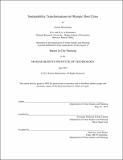| dc.contributor.advisor | JoAnn Carmin. | en_US |
| dc.contributor.author | Mokrushina, Ksenia | en_US |
| dc.contributor.other | Massachusetts Institute of Technology. Dept. of Urban Studies and Planning. | en_US |
| dc.date.accessioned | 2012-10-10T14:54:36Z | |
| dc.date.available | 2012-10-10T14:54:36Z | |
| dc.date.copyright | 2012 | en_US |
| dc.date.issued | 2012 | en_US |
| dc.identifier.uri | http://hdl.handle.net/1721.1/73706 | |
| dc.description | Thesis (M.C.P.)--Massachusetts Institute of Technology, Dept. of Urban Studies and Planning, 2012. | en_US |
| dc.description | This electronic version was submitted by the student author. The certified thesis is available in the Institute Archives and Special Collections. | en_US |
| dc.description | Cataloged from student submitted PDF version of thesis. Page 101 blank. | en_US |
| dc.description | Includes bibliographical references (p. 95-100). | en_US |
| dc.description.abstract | The Olympic Games represent an unparalleled fast-track urban development opportunity for Olympic host cities. Taking the premise that the transformational effect of the Olympics has a potential to drive long-term urban sustainability, this thesis examines how Olympic host cities can use the Olympic planning process to transition to a more sustainable model of urban development. Presenting the case of the Vancouver 2010 Olympics, this thesis draws planning lessons for Sochi 2014 and other future Olympic host cities and discusses policy implications for the International Olympic Committee. The City of Vancouver's systematic efforts to integrate sustainability principles in Olympic planning created sustainability co-benefits exceeding the initial sustainability commitments of the bid book. The development of the Olympic Village generated a massive amount of urban sustainability learning by the City planning staff, thus majorly accelerating sustainability policies in the areas of energy efficiency, green building, district energy, urban design and agriculture. Taking advantage of an unprecedented opportunity to experiment with the "urban laboratory" of the Olympics, the City fostered improved citizens' perception of public space and transit, which gave rise to a sustained increase in transit ridership, walking and biking after the Games. The City was able to achieve these outcomes through integrating the Games into its long-term urban development strategy, strategic sustainability thinking and visioning, principled approach to planning, building partnerships with key stakeholders and leveraging resources from senior levels of government, ensuring that the interests of the organizing committee and city entrepreneurs do not dominate the planning process, engaging and consulting with community groups and educating the citizens. Lasting sustainability legacies of the Vancouver Olympics arose from a highly collaborative, inclusive and coordinated process involving all levels of government, multiple City agencies, private sector, VANOC, community groups and citizens. The applicability of the policy lessons learned from Vancouver's case is questionable in developing countries, authoritarian regimes and cities with little to no previous experience in urban sustainability. The IOC should play a more active role in preventing sustainability debacles in these policy contexts. | en_US |
| dc.description.statementofresponsibility | by Ksenia Mokrushina. | en_US |
| dc.format.extent | 101 p. | en_US |
| dc.language.iso | eng | en_US |
| dc.publisher | Massachusetts Institute of Technology | en_US |
| dc.rights | M.I.T. theses are protected by
copyright. They may be viewed from this source for any purpose, but
reproduction or distribution in any format is prohibited without written
permission. See provided URL for inquiries about permission. | en_US |
| dc.rights.uri | http://dspace.mit.edu/handle/1721.1/7582 | en_US |
| dc.subject | Urban Studies and Planning. | en_US |
| dc.title | Sustainability transformations in Olympic host cities | en_US |
| dc.type | Thesis | en_US |
| dc.description.degree | M.C.P. | en_US |
| dc.contributor.department | Massachusetts Institute of Technology. Department of Urban Studies and Planning | |
| dc.identifier.oclc | 811342184 | en_US |
